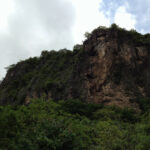
Music has guided Congolese singer/songwriter and guitarist Siama Matuzungidi since he left home with his guitar at the age of 17. His travels took him from the rural countryside to Kinshasa, Uganda and Nairobi. He can be heard on classic recordings by legendary Congolese artists, including Kanda Bongo Man, Sam Mangwana, Tshala Muana, and Samba Mapangala with Orchestra Virunga.
After living in Japan and Dubai, he relocated to the Twin Cities. He feared he may not be able to play soukous in Minnesota, but instead of giving up he decided to incorporate other musical styles into his music, tapping into a diverse community of musicians in the area. The result is Rivers – from the Congo to the Mississippi, an album that brings together his beloved soukous with a variety of outside influences tinged with blues and jazz.
The album opens with “Jungle Zombie,” an upbeat song about going to the farm in the morning to get food. The ensemble instantly reveals an enticing level of depth with strong group vocals, tremendous fretless bass, guitars, piano, trumpet, drums and percussion.
The momentum slows to a relaxed pace on “Mpevo,” a song about a powerful and inspiring spirit. Nirmala Rajasekar steals the show on vocals and lithe veena, adding a Carnatic dimension to the music.
“Sisili” is a classic soukous love song that speaks of a passion so intense, the namesake’s father came from out of town and took his daughter away from Matuzungidi when it was originally recorded. Here it is reimagined with the surprising addition of Joe Savage on pedal steel. While it may catch the listener off guard, the pedal steel settles into mix well with the help of some organ, offering a unique texture to this blend of soukous.
Another reprised hit is “Kueya,” a track originally recorded with Samba Mapangala. Here Matuzungidi sings about forgiveness over tight, interlaced guitar playing.
“Maisha Mazuri” reintroduces the veena on this driving, uptempo song. The band finds an easy stride which is lifted by some nice piano work and Rajasekar’s vocal solo. “Ndombolo” also features veena and adds dranyen and cello on a swinging blues groove that includes some great singing by Matuzungidi, Rajasekar, Tenzin Ngawang, JD Steele and Dallas Johnson.
“Yolanda” is a beautiful love song featuring cello, piano and dranyen. Ngawang and Johnson add warm, balanced harmony to Matuzungidi’s vocals. “Oyayeyo” closes the album well, reintroducing most of the instruments in a tender song about parents’ mix of joy and despair as their kids leave home.
On the surface it seems like some of these instrumental choices may not fit with soukous, but it provides a supportive platform for the musicians to add their own voices. Lithe veena, dranyen, pedal steel guitar and cello work their way into the seams of these compositions. A special mention goes out to Tony Axtell’s bass playing which ties everything together and is consistently at the heart of each number. Matuzungidi is making music that reflects the diverse community he lives in and the end result is a set of songs that breathe fresh ideas into a classic sound.
Originally published in RootsWorld Magazine.




Be First to Comment